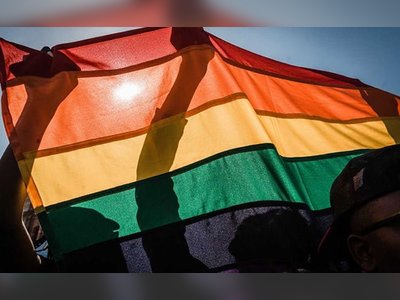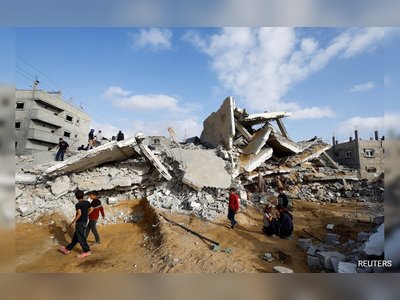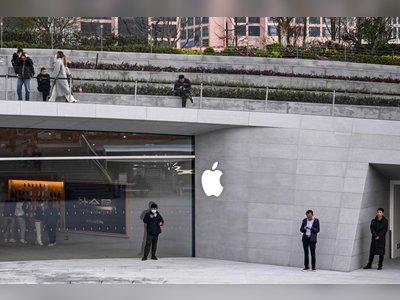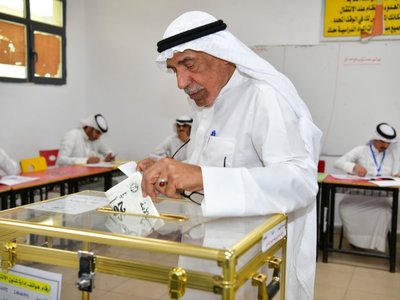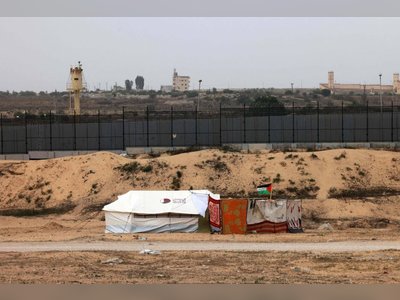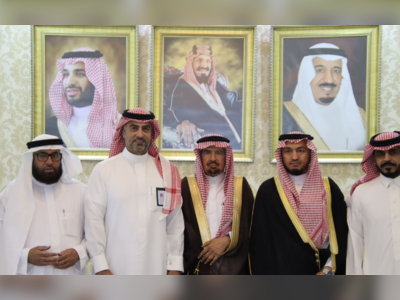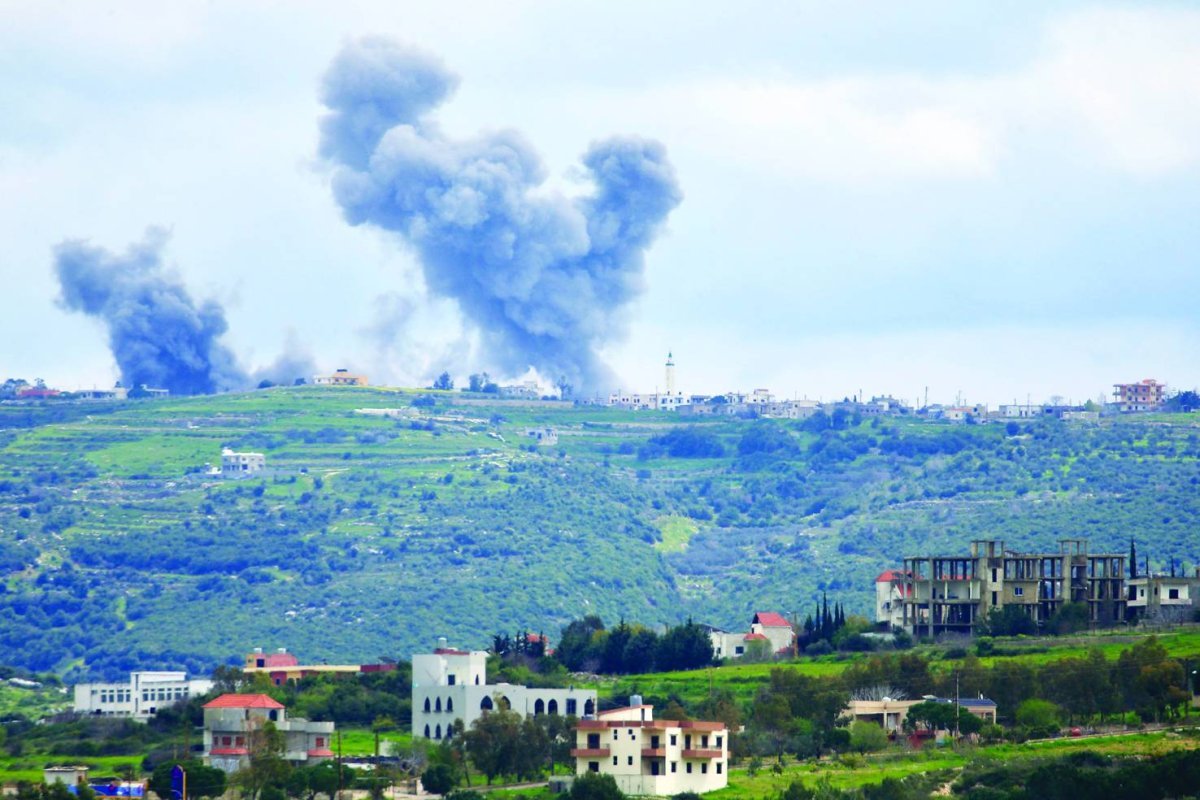
Clashes in Southern Lebanon Subside and Intensify Amid Gaza Negotiations and Field Conditions
Establishing New Rules of Engagement
Following more than a week of unprecedented de-escalation in the military confrontations on the Lebanese southern front, which Hezbollah decided to use as a launching pad for military operations in support of Gaza, the region has heated up again in the past few hours without warning.
Following more than a week of unprecedented de-escalation in the military confrontations on the Lebanese southern front, which Hezbollah decided to use as a launching pad for military operations in support of Gaza, the region has heated up again in the past few hours without warning.
The Israeli operations have expanded to include Baalbek and the western Bekaa Valley in the east of the country.
The intensity of the confrontations resumed shortly after Hezbollah announced the use of two drones to target Iron Dome platforms in the "Kfar Blum" settlement in the Upper Galilee, prompting an Israeli response targeting Baalbek and a vehicle in the western Bekaa Valley, marking the first such strikes since the "Al-Aqsa Flood."
It became apparent that both parties to the conflict, Hezbollah and Israel, who had adhered to specific rules of engagement since the July 2006 war, are now unofficially following new rules. These dictate that when Hezbollah uses drones or carries out special operations, the Baalbek area is targeted, and the scope of Lebanese areas subjected to strikes is expanded.
After mourning the last of its fighters on the twelfth of this month, Hezbollah mourned two more members with the resurgence of military momentum on the southern front.
The Field Situation Controls the Front
While many believe that the reduction and escalation of operations are linked to the negotiation process for a ceasefire in Gaza and unofficial understandings between Israel and Hezbollah facilitated by mediators, others think that Tel Aviv's prioritization of Rafah and the exclusion of Washington's intervention in a broader war against Lebanon, given the significant differences between the Israeli and American administrations, are factors leading to a decrease in the frequency of Israeli military operations in the south. These operations are now largely reactive to Hezbollah's actions.
Hezbollah sources indicate that "operations fluctuate in intensity depending on field conditions," denying to "Al Sharq Al Awsat" that there are any new developments that would quiet the front.
Informed sources familiar with the party's atmosphere told "Al Sharq Al Awsat" that "Hezbollah's operations against Israeli military centers continue at the same pace," noting that "what deserves attention is Israel's abstention for more than 12 days from chasing vehicles in southern Lebanon for specific targets, as well as its abstention from bombing inside villages." They added: "Israel may have realized that it cannot draw Hezbollah into an extended war nor drag Washington into fighting on its behalf in Lebanon, adding to that Hezbollah has successfully closed many gaps that Israel used to exploit to inflict casualties among its ranks."
Surpassing the Open War Project
Opposition political activist Ali Al-Amin believes that "the decrease in the intensity of clashes and bombings in southern Lebanon regions sometimes does not reflect a path toward calm or a ceasefire, as long as there is no agreement yet on a settlement between the two sides." He suggested in a statement to "Al Sharq Al Awsat" that "the current form of skirmishes might pave the way for long-term Israeli operations, maintaining an open front subject to escalation and calm until a settlement is reached, which seems to require more time."
Al-Amin adds: "Therefore, the apparent calm or ongoing skirmishes may represent surpassing the open war project and dispensing with it in favor of a strategy to exhaust Hezbollah, engaging in assassination and hunting down its cadre periodically but persistently and indefinitely."
He points out that "Israel has imposed a rhythm for the confrontation in this war, undermining the so-called rules of engagement that Hezbollah clung to and threatened Israel with retaliating in kind if civilians and fighters were targeted," highlighting that "there's a rhythm that Israel seems more in control of than Hezbollah, reflecting Israel's long reach in targeting Hezbollah and Lebanon."
Unannounced Agreement
Dr. Hilal Khashan, a Political Science professor at the American University, links the reduction in the intensity of confrontations in the south at times to the visit by Hezbollah's Liaison and Coordination Unit head, Wafiq Safa, to the UAE. He reminds that "the UAE's relationship with Israel is excellent, and Syrian President Bashar al-Assad mediated for Hezbollah to move the file of the party's detainees in the UAE," excluding that the discussions exclusively covered this file as Hezbollah confirms, and "noticing an unspecified agreement on reducing operations and limiting strikes to targets that do not cause significant damage and human losses."
Khashan believes that "the party wants to find a way out of the dilemma it has placed itself in, knowing that stopping operations entirely is linked to its withdrawal back to the north of the Litani River, and this could find a suitable exit when the time comes," adding, "The Gaza issue is complicated, which will keep the Lebanese front open for now, but at a milder pace than previously. Israel is under significant American pressure; therefore, it is currently focusing on the Rafah issue to address the situation in southern Lebanon later."
Outgoing Prime Minister Najib Mikati has affirmed that his government "continues its international and Arab diplomatic contacts to stop the Israeli aggression on Lebanon," noting that "the results of these contacts seem positive so far, without overlooking a fundamental issue, that it is impossible to rely on any positive stance or guarantee offered by the Israeli enemy."
Meanwhile, the American envoy Amos Hochstein, who visited Lebanon at the beginning of the month, carried a "threatening message" to Lebanese officials that "the ceasefire in Gaza would not necessarily automatically extend to Lebanon," stressing that "escalation is dangerous, and there is no such thing as a limited war."
The intensity of the confrontations resumed shortly after Hezbollah announced the use of two drones to target Iron Dome platforms in the "Kfar Blum" settlement in the Upper Galilee, prompting an Israeli response targeting Baalbek and a vehicle in the western Bekaa Valley, marking the first such strikes since the "Al-Aqsa Flood."
It became apparent that both parties to the conflict, Hezbollah and Israel, who had adhered to specific rules of engagement since the July 2006 war, are now unofficially following new rules. These dictate that when Hezbollah uses drones or carries out special operations, the Baalbek area is targeted, and the scope of Lebanese areas subjected to strikes is expanded.
After mourning the last of its fighters on the twelfth of this month, Hezbollah mourned two more members with the resurgence of military momentum on the southern front.
The Field Situation Controls the Front
While many believe that the reduction and escalation of operations are linked to the negotiation process for a ceasefire in Gaza and unofficial understandings between Israel and Hezbollah facilitated by mediators, others think that Tel Aviv's prioritization of Rafah and the exclusion of Washington's intervention in a broader war against Lebanon, given the significant differences between the Israeli and American administrations, are factors leading to a decrease in the frequency of Israeli military operations in the south. These operations are now largely reactive to Hezbollah's actions.
Hezbollah sources indicate that "operations fluctuate in intensity depending on field conditions," denying to "Al Sharq Al Awsat" that there are any new developments that would quiet the front.
Informed sources familiar with the party's atmosphere told "Al Sharq Al Awsat" that "Hezbollah's operations against Israeli military centers continue at the same pace," noting that "what deserves attention is Israel's abstention for more than 12 days from chasing vehicles in southern Lebanon for specific targets, as well as its abstention from bombing inside villages." They added: "Israel may have realized that it cannot draw Hezbollah into an extended war nor drag Washington into fighting on its behalf in Lebanon, adding to that Hezbollah has successfully closed many gaps that Israel used to exploit to inflict casualties among its ranks."
Surpassing the Open War Project
Opposition political activist Ali Al-Amin believes that "the decrease in the intensity of clashes and bombings in southern Lebanon regions sometimes does not reflect a path toward calm or a ceasefire, as long as there is no agreement yet on a settlement between the two sides." He suggested in a statement to "Al Sharq Al Awsat" that "the current form of skirmishes might pave the way for long-term Israeli operations, maintaining an open front subject to escalation and calm until a settlement is reached, which seems to require more time."
Al-Amin adds: "Therefore, the apparent calm or ongoing skirmishes may represent surpassing the open war project and dispensing with it in favor of a strategy to exhaust Hezbollah, engaging in assassination and hunting down its cadre periodically but persistently and indefinitely."
He points out that "Israel has imposed a rhythm for the confrontation in this war, undermining the so-called rules of engagement that Hezbollah clung to and threatened Israel with retaliating in kind if civilians and fighters were targeted," highlighting that "there's a rhythm that Israel seems more in control of than Hezbollah, reflecting Israel's long reach in targeting Hezbollah and Lebanon."
Unannounced Agreement
Dr. Hilal Khashan, a Political Science professor at the American University, links the reduction in the intensity of confrontations in the south at times to the visit by Hezbollah's Liaison and Coordination Unit head, Wafiq Safa, to the UAE. He reminds that "the UAE's relationship with Israel is excellent, and Syrian President Bashar al-Assad mediated for Hezbollah to move the file of the party's detainees in the UAE," excluding that the discussions exclusively covered this file as Hezbollah confirms, and "noticing an unspecified agreement on reducing operations and limiting strikes to targets that do not cause significant damage and human losses."
Khashan believes that "the party wants to find a way out of the dilemma it has placed itself in, knowing that stopping operations entirely is linked to its withdrawal back to the north of the Litani River, and this could find a suitable exit when the time comes," adding, "The Gaza issue is complicated, which will keep the Lebanese front open for now, but at a milder pace than previously. Israel is under significant American pressure; therefore, it is currently focusing on the Rafah issue to address the situation in southern Lebanon later."
Outgoing Prime Minister Najib Mikati has affirmed that his government "continues its international and Arab diplomatic contacts to stop the Israeli aggression on Lebanon," noting that "the results of these contacts seem positive so far, without overlooking a fundamental issue, that it is impossible to rely on any positive stance or guarantee offered by the Israeli enemy."
Meanwhile, the American envoy Amos Hochstein, who visited Lebanon at the beginning of the month, carried a "threatening message" to Lebanese officials that "the ceasefire in Gaza would not necessarily automatically extend to Lebanon," stressing that "escalation is dangerous, and there is no such thing as a limited war."
Translation:
•
Translated by AI
